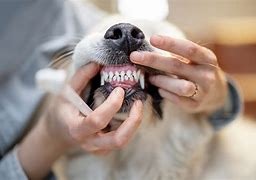February is National Pet Dental Health Month, a time to raise awareness about the importance of proper dental care for our furry friends. Just like us, dogs and cats can suffer from periodontal disease, which can lead to pain, tooth loss, and even impact their overall health. In this blog post, we will discuss preventative measures for periodontal disease and share signs that indicate your dog may need a dental cleaning.

Preventative Measures for Periodontal Disease
1. Establish a Dental Care Routine: Start by incorporating dental care into your pet's daily routine. Brushing their teeth regularly using a pet-friendly toothbrush and toothpaste can significantly reduce plaque and tartar buildup.
2. Choose Dental Chews and Toys Wisely: Dental chews and toys designed to promote dental health can be a valuable addition to your pet's oral care regimen. Look for products approved by veterinarians that help remove plaque, massage gums, and freshen breath.
3. Dietary Considerations: Feeding your pet a balanced diet with dental benefits can contribute to their oral health. Consult with your veterinarian about specially formulated dental diets or treats that can help prevent dental problems.
4. Regular Dental Examinations: Schedule routine dental examinations with your veterinarian.
These exams can help identify any early signs of dental issues and allow for timely intervention. Your vet will assess your pet's overall oral health, clean the teeth professionally, and recommend any necessary treatments.
When Does Your Pet Need a Dental Cleaning?
While dental care at home is vital, professional dental cleanings are also necessary for maintaining optimal oral health in your pet. Here are some signs that indicate your dog may need a dental cleaning:
1. Bad Breath: Foul-smelling breath can be a sign of underlying dental problems like periodontal disease. If your dog's breath is consistently unpleasant, it's time to consult your veterinarian.
2. Difficulty in Eating: If you notice your dog having trouble chewing their food, dropping it, or favoring one side of the mouth while eating, it may be due to dental pain or discomfort.
3. Visible Signs of Dental Issues: Examine your dog's teeth and gums regularly. Signs of concern include swollen, red or bleeding gums, tartar buildup, loose or missing teeth, or pus around the gums.
4. Behavioral Changes: Dental pain can cause behavioral changes in dogs. They may display increased irritability, reluctance to play with chew toys, or withdrawal from activities they once enjoyed.
What Are the Effects of Long-Term Periodontal Disease?
Long-term periodontal disease can have systemic effects on a dog's overall health. The chronic inflammation and infection associated with periodontitis can lead to a range of systemic changes [1]. Here are some examples:
1. Heart Disease: Studies have found a connection between periodontal disease and an increased risk of cardiovascular problems, including heart disease and endocarditis [1][3]. The bacteria from the infected gums can enter the bloodstream and potentially affect the heart and its surrounding tissues.
2. Respiratory Issues: The oral bacteria associated with periodontal disease can be inhaled into the lungs, triggering or exacerbating respiratory conditions such as pneumonia and bronchitis [1][4]. This can be particularly concerning for pets with pre-existing respiratory issues.
3. Liver and Kidney Damage: The chronic inflammation caused by periodontal disease can impact the liver and kidneys by increasing the production of inflammatory substances [1][4]. Over time, this can contribute to damage and dysfunction of these vital organs.
4. Diabetes: Periodontal disease has been linked to poor glycemic control in diabetic animals [1]. The inflammation and infection associated with periodontitis can make it challenging to regulate blood sugar levels, leading to complications in diabetic pets.
National Pet Dental Health Month provides an excellent opportunity to assess your pet's oral health and take proactive steps to prevent dental problems. Regular dental care, both at home and with your veterinarian, can help your furry friend enjoy a happy, healthy smile for years to come. Don't hesitate to schedule an appointment with your veterinarian to evaluate your pet's dental health and discuss the best dental care options.
Remember, a healthy smile leads to a healthy pet!
